For Singapore’s National Day 2021, the 15-episode English period drama, “This Land is Mine”, premiered on Mediacorp’s meWATCH and Channel 5. Based on Professor Walter Woon SC’s 2011 novel, The Devil’s Circle, the series is inspired by historical events set in Singapore during the British Military Administration. It unfolds stories of the tumultuous “new normal” in post-war Singapore, against a backdrop of family turmoil, betrayal, courtroom intrigue and struggle for power. In this interview, Professor Woon lets us in on his motivations for penning The Devil’s Circle, which is part of a four-part series called The Advocate’s Devil, as he relates timeless take-aways to the practice of law.
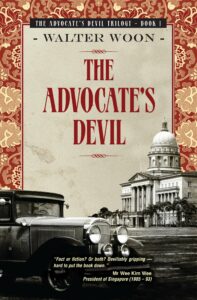
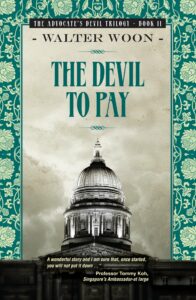
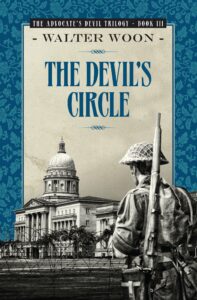
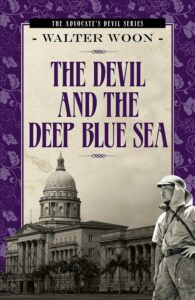
The Advocate’s Devil is a four-part series that comprises The Advocate’s Devil (2002), The Devil to Pay (2005), The Devil’s Circle (2011), and The Devil and the Deep Blue Sea (2014). The Devil and the Deep Blue Sea fills the gap between The Devil to Pay and The Devil’s Circle, so chronologically it is the third book although written after The Devil’s Circle. The Quartet spans the period from 1937 to 1945.
The first story in The Advocate’s Devil “The Body in Question”, is adapted from a story I wrote which had won a minor prize in the National Short Story Competition in the mid-1990s. The protagonist featured in the original story was Eurasian. Before “The Body in Question”, I wrote “Sinclair’s War”, which had placed third in the Asiaweek (a now defunct news magazine) short story competition in the early 1990s. Once again, the protagonist in “Sinclair’s War” was Eurasian.
There was very little literature written about the Baba-Nonya (Straits Chinese) community, which is distinctively Singaporean. I realised that I don’t know much about Eurasians because I am not a Eurasian myself. Hence, I decided to write something about my Baba community.
Traditionally, a ‘devil’ is someone who stands in for another lawyer; this no longer the practice in Singapore, However, rather than deviling for his boss Clarence d’Almeida in court cases, the protagonist Dennis Chiang assists when d’Almeida gets involved in investigations on the side.
Lee Thean-Jeen (TJ) read The Devil’s Circle, and was intrigued by how the series was written from a Singaporean’s point of view. Most of the books and stories about the War were written by white men from a white man’s perspective. Moreover, there was practically nothing about the immediate post-War period. He approached me some years ago for an option to turn The Devil’s Circle into a TV series. TJ and his crew from Weiyu Films (a content-creation and production company founded by TJ himself) then persuaded Mediacorp to produce the series based on The Devil’s Circle. Similarly, Mediacorp was also interested in producing the series because the novel was written from a local’s perspective. A local voice had always been absent from such stories.
Many of the stories I wrote dealt with the real-life legal problems. There are many human-interest stories that can be drawn from the practice of law.
The first story in The Devil’s Circle was about the trial of a minor war criminal, a member of the Kempeitai who was accused of torturing people. There were in fact such trials in Singapore immediately after the War. The Devil’s Circle drew inspiration from the some of the real cases.
Though the plot in This Land is Mine is different from my novel, they kept the names of the major characters. However, it is a completely different work and only loosely based on my book. The actor playing Clarence d’Almeida, a key character in the novels, had medical problems at the start of filming and could not carry on. This of course threw everything off, so the final product is not the same as the source material.
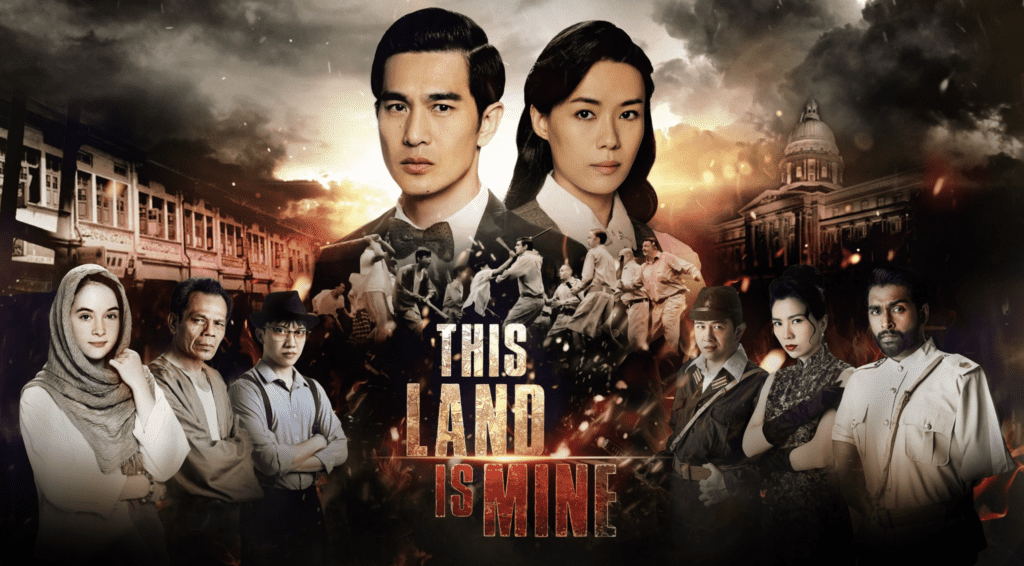
In my other books, I wrote about legal problems such as the conflict of laws and company law issues that are relevant to the current generation of lawyers.
I dealt with situations that could be real problems, for example how does one prove a case that involves a pair of identical twins who have been accused of raping a woman? It is easier to discuss these legal issues in a fictional context rather in an academic book.
In The Devil’s Circle, Dennis Chiang is assigned to defend a Kempeitai officer who has been accused of torturing civilians. As a result, Dennis faces intense criticism from his family and the public because of the atrocities carried out by the occupying Japanese forces in wartime Singapore. Defending such an unpopular accused raises an ethical issue on the moral obligations of professionals.
I hope readers of my books, especially lawyers, will recognise some of these situations still do have a contemporary resonance. I trust that RHT lawyers will do the right thing, because it is so easy for lawyers to lie for the client and make up a defence. At RHTLaw Asia, we must do things right all the time, even when the client does not like or want to hear it. It is our job as legal counsel to advise clients and sometimes tell them that we can’t do it that way. These are the kind of values that we need to inculcate in the younger generation of lawyers.
Of course, I am happy to hear from anyone who has any comments on the historical or legal aspects discussed in my books. It would be interesting to spark a discussion among Singaporeans and conduct an analysis of the legal, cultural, and historical aspects of the Quartet. History is important. Who we are today is a result of what happened in the past.
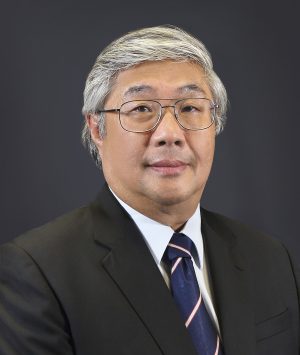
Professor Walter Woon, SC
Senior Consultant
walter.woon@rhtlawasia.com
+65 6381 6751
Professor Walter Woon is a Senior Consultant and Non-Executive Chairman of RHTLaw Asia. Through his career, Professor Woon has held several prestigious positions and has had experience in legal practice, diplomacy and academia both locally and internationally.
Professor Woon has appeared in the High Court and Court of Appeal on many occasions, representing the President as co-counsel in Constitutional Reference No 1 of 1995, which is the only case heard by the Constitutional Tribunal to date.
He is author of several law books, including The ASEAN Charter: A Commentary (2015); Walter Woon on Company Law (now in its third edition, edited by Professor Tan Cheng Han), a standard text on company law used in law and business schools in Singapore. In addition, he is also the author of reference works such as The Companies Act of Singapore: An Annotation (originally co-written with Andrew Hicks, now forming the basis of Woon’s Corporations Law); and Towards a Rules-Based Community: An ASEAN Legal Service (with Jean-Claude Piris).
He has also published articles in the Malayan Law Journal, the Malaya Law Review, the Securities Industry Review, the Law Society Journal, the Singapore Academy of Law Journal, the Australian Journal of Corporate Law, the Pacific Rim Law and Policy Journal, the Korean Society of International Law Journal and the Chinese (Taiwan) Yearbook of International Law and Affairs.

RHTLaw Asia is a member of ONERHT, an integrated network of multidisciplinary professional and specialist services which empowers stakeholders to achieve purposeful growth.
© 2024 RHTLaw Asia LLP. All Rights Reserved.
| Cookie | Duration | Description |
|---|---|---|
| cookielawinfo-checkbox-analytics | 11 months | This cookie is set by GDPR Cookie Consent plugin. The cookie is used to store the user consent for the cookies in the category "Analytics". |
| cookielawinfo-checkbox-functional | 11 months | The cookie is set by GDPR cookie consent to record the user consent for the cookies in the category "Functional". |
| cookielawinfo-checkbox-necessary | 11 months | This cookie is set by GDPR Cookie Consent plugin. The cookies is used to store the user consent for the cookies in the category "Necessary". |
| cookielawinfo-checkbox-others | 11 months | This cookie is set by GDPR Cookie Consent plugin. The cookie is used to store the user consent for the cookies in the category "Other. |
| cookielawinfo-checkbox-performance | 11 months | This cookie is set by GDPR Cookie Consent plugin. The cookie is used to store the user consent for the cookies in the category "Performance". |
| viewed_cookie_policy | 11 months | The cookie is set by the GDPR Cookie Consent plugin and is used to store whether or not user has consented to the use of cookies. It does not store any personal data. |